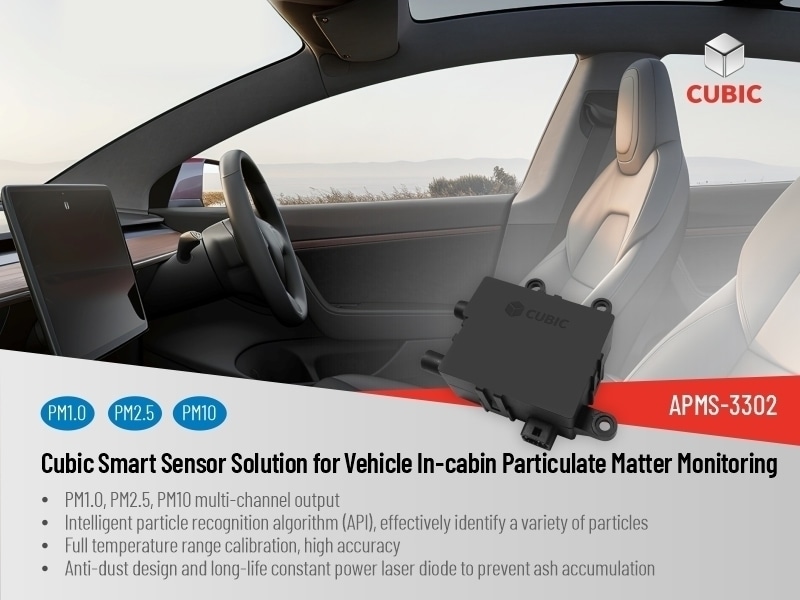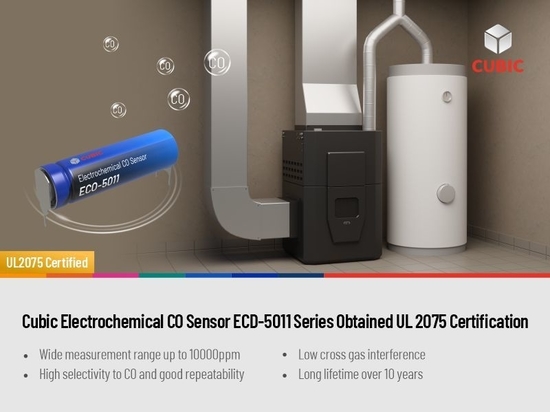
#Product Trends
Cubic Smart Sensor Solution for Vehicle In-cabin Particulate Matter Monitoring
How Cubic In-Cabin Sensor Solution Assists in Healthier Driving Experience?
In recent years, the issue of in-cabin air quality has gained widespread attention. Following the EU Air Quality Directive (2008/50/EC), member states are striving to reduce particulate matter (PM10 and PM2.5) in the air to protect people from the harmful effects of air pollution. Simultaneously, under the European Green Deal, the EU has set a target to achieve "zero pollution" by 2050. The Zero Pollution Action Plan released in 2021 further emphasizes the importance of improving human health and the environment by reducing air pollution.
Vehicles, as a major source of pollution, not only emit particulate matter into the external environment but also let external pollutants to enter the cabin through ventilation systems when driving. The increase in PM (particulate matter) concentration inside a vehicle can be attributed to several factors:
1.External Factors:
• External Air Pollution: Poor outdoor air quality, especially during smoggy weather, can lead to higher particulate matter (PM) levels inside the vehicle when using external air circulation.
• Traffic and Exhaust Pollution: Congested traffic and idling in enclosed spaces increase exposure to harmful exhaust pollutants.
• Road Conditions: Driving on dusty or muddy roads leads more particulates into the vehicle.
2.Internal Factors:
• In-Car Pollution Sources: Materials like upholstery and plastics can release particles, while activities like smoking or using sprays can contribute to higher PM levels.
3.Vehicle Functional Factors:
• Air Circulation Issues: Prolonged internal air circulation prevents fresh air exchange, allowing pollutants to accumulate inside the cabin.
• Filter Problems: An old or clogged air conditioning filter reduces filtration efficiency, allowing more particulate matter to enter the vehicle.
As a tool for daily work and travel, people spend a long time in the car. Long-term exposure to high concentrations of particulate matters can lead to a variety of health problems, especially respiratory and cardiovascular diseases. PM2.5 can penetrate deep into the lungs and even enter the blood circulation, causing chronic inflammation, breathing difficulties, worsening asthma, and increased risk of cardiovascular disease. For sensitive groups (such as children, the elderly, and asthma patients), long-term exposure to polluted environments poses a greater health risk. Improving in-cabin air quality has therefore become important.
Having the awareness of the issue of in-cabin particulate matter, Cubic, as a leading manufacturer of smart gas sensors and high-end gas analyzers, has leveraged its mature light scattering technology and developed automotive PM sensor (Basic Version), APMS-3302, for vehicle in-cabin particulate matter concentration level monitoring.
Cubic APMS-3302 LSD particulate matter sensor is designed for high-performance operation in demanding environments, offering exceptional reliability and accuracy. It offers simultaneous measurement of PM1.0, PM2.5, and PM10 particles, providing comprehensive air quality data across various particle sizes. It covers a measurement range of 0 to 1000μg/m³, with a resolution of 1μg/m. Cubic automotive PM sensor also features an intelligent particle recognition algorithm (API) for effectively identification of a variety of particles. With full temperature range calibration, APMS-3302 maintains high accuracy in different environments. Its anti-dust design and long-life constant power laser diode prevent ash accumulation, ensuring durability and consistent performance. Additionally, the low-noise, constant-speed automotive-grade blower guarantees stable and reliable readings, making this sensor ideal for high-precision particulate matter detection.
In addition to providing single PM2.5 sensor, Cubic also has already innovatively developed diversified automotive combo air quality sensor solutions based on PM2.5 parameter embedded with other gas sensors of CO2 sensor, AQS sensor, temperature and humidity sensor. The mature and flexible integrated air quality sensors has provided and realized a more comprehensive and efficient air quality monitoring for the in-cabin HVAC application. In the future, Cubic will continuously provide diversified gas sensors to meet the dynamic demands, to foster safer driving environments in the automotive industry.
To know more about product details, please click on https://en.gassensor.com.cn/AutomotiveAirQualitySensor/list.html or contact us sales@gassensor.com.cn .





